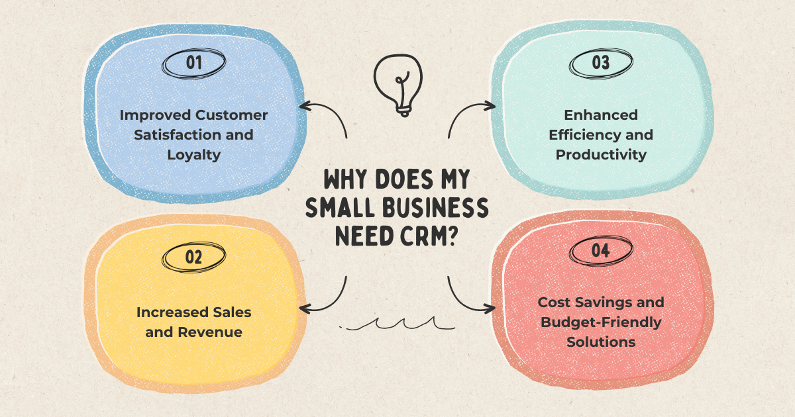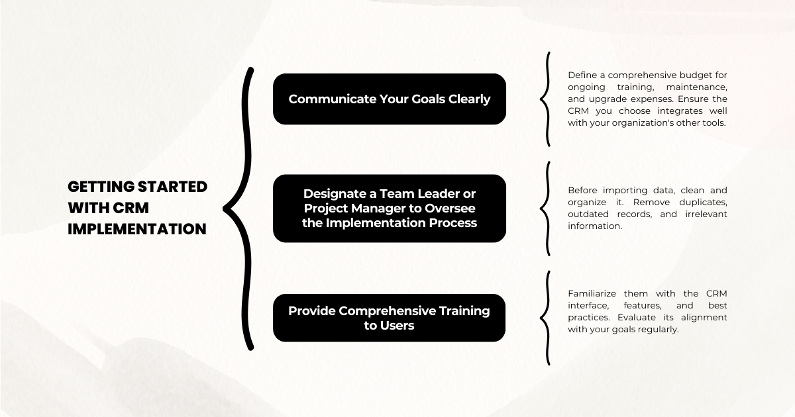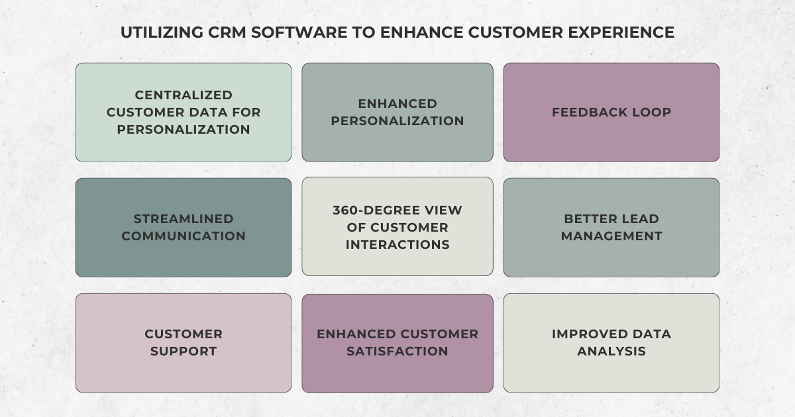As a small business owner or entrepreneur, your customers are the vital force of your company. Maintaining a strong client base in new business depends on providing customer experiences.
Here's where Customer Relationship Management (CRM) can make a difference. The impact of CRM is essential for businesses. It is the process of acquiring, retaining, and growing profitable customers. It is a strategy for building relationships with customers. Businesses can increase the efficacy of their marketing, sales, and service.
In this article, we’ll explain what CRM is, why it matters, and practical steps for successful implementation.
Understanding CRM Systems
What is a CRM system?
CRM system is a comprehensive tool designed to centralize and manage customer data. It is a digital hub to analyze user behavior and tailor services to customer's needs.
The system develops relationships with your clients and understanding them.
The most common misconception is that ERP and CRM are interchangeable. But it's not always the case.
Before we break CRM down, we recommend researching the difference between ERP and CRM to know the difference and pick the solution that addresses your issues.
How Can a CRM System Benefit Your Business?
1. Give you a comprehensive picture of your customers. The abundance of client data has high interactions that promote growth and loyalty.
2. Say goodbye to scattered emails and missed follow-ups. CRM makes it easier for teams to work together. It ensures timely responses and easy communication, which ultimately improves the client experience.
3. Assists you in completing more transactions and optimizing tasks.
4. Solutions facilitate data-driven messaging, campaign analysis, and audience segmentation. CRM-targeted marketing campaigns to engage with your target market.
Types of CRM Systems Available
1. Operational: Focuses on day-to-day processes like sales automation, marketing, and customer service.
2. Analytical: Data analysis, helping you understand trends, customer behavior, and market dynamics.
3. Collaborative: Promotes cooperation and communication between customer-focused departments.
Implementing CRM for Small Businesses
For small businesses, adopting a CRM solution can be revolutionary. It is to consider features, cost, and integration to identify the system company. Consider cloud-based solutions for their flexibility and cost-effectiveness.
Why Does My Small Business Need CRM?
In today's competitive marketplace, CRM systems are essential for small businesses. Their adoption is critical to streamlining operations and gaining valuable insights to succeed and thrive.

1. Improved Customer Satisfaction and Loyalty
CRM builds stronger relationships by remembering important facts, previous encounters, and client preferences, allowing for customized interactions.
The system effectively nurtures leads by tracking customer interactions, reducing churn, and increasing loyalty.
2. Increased Sales and Revenue
Tasks are automated by CRM, allowing sales teams to concentrate on work and close more deals. Sales teams may more effectively cultivate long-lasting connections with customers.
3. Enhanced Efficiency and Productivity
CRM reduces manual work, allowing teams to focus on strategy and driving growth. Sharing data promotes cooperation so that everyone is pursuing the same customer-focused objectives.
4. Cost Savings and Budget-Friendly Solutions
CRM reduces the need to save time and money. It helps optimize marketing efforts by providing data-driven insights.
Choosing the Right CRM for Your Small Business

Choosing the right CRM system can significantly impact your business's success. Follow these essential steps to guide you toward the perfect CRM:
1. Identify Your Pain Points: Reflect on your business challenges and objectives. What specific problems does the CRM need to address? Be precise, such as improving follow-up processes or streamlining communication with warm leads.
2. List Your Go-To Apps: Take inventory of the apps. Look for a CRM that integrates seamlessly with these tools.
3. Map CRM Features to Your Needs: Consider your business goals. If efficiency is crucial, focus on workflow automation features. If sales forecasting matters, prioritize tools with forecasting capabilities.
4. Refine Your Search: Use Google to explore CRM options. Look for systems that align with your business objectives and are action-focused. The action is very helpful as it transforms a contact database into a dynamic to-do list
5. Assess User-Friendliness: A user-friendly CRM ensures smooth adoption by your team. Test the interface and navigation to ensure it aligns with your workflow.
6. Evaluate Mobile Options: In today's mobile world, consider a CRM's mobile friendliness. Can your team access it on the go?
7. Check Security Measures: Ensure the CRM system prioritizes data security. Look for encryption, backup, and recovery features.
8. Read Customer Reviews: Learn from others' experiences. Reviews provide insights into real-world usage and potential pitfalls.
9. Talk to Support: Contact the CRM provider's support team and assess their responsiveness and willingness to assist.
10. Register for a Free Trial: Test-drive the CRM firsthand. Evaluate its functionality, ease of use, and compatibility with your business processes.
11. Avoid Overwhelming Functionality: choose one that aligns with your budget and priorities.
12. Build Relationships: Look for a CRM that fosters client connections. It's not just about data – it's about building lasting relationships.
13. Beware of Hidden Costs: Scrutinize pricing models. Ensure there are no surprises down the road.
When choosing the right CRM for your small business, consider factors such as ease of integration, automation, data analysis, customer service, and affordability.
For instance, you are looking for an all-in-one integrated solution to manage both your customer relationships and sales. At the same time, you also want to have these data connected to other operational modules. As a solution, you choose a CRM that belongs to an ERP, such as Odoo CRM.
Getting Started with CRM Implementation
The implementation of CRM is optimizing workflows and customer relations. Assemble a team responsible for selecting and implementing the system. Include representatives from sales, marketing, IT, and customer service.

1. Communicate Your Goals Clearly.
Define a comprehensive budget for ongoing training, maintenance, and upgrade expenses. Ensure the CRM you choose integrates well with your organization's other tools. Research and compare CRM solutions. Consider factors like ease of use, scalability, customization options, and pricing. Remember, you always want your solution to address your needs. So, always research the features of the CRM modules you are about to implement.
2. Designate a Team Leader or Project Manager to Oversee the Implementation Process.
Before importing data, clean and organize it. Remove duplicates, outdated records, and irrelevant information.
3. Provide Comprehensive Training to Users.
Familiarize them with the CRM interface, features, and best practices. Evaluate its alignment with your goals regularly. Adjust configurations, workflows, and integrations as needed. People are the key to a successful CRM deployment.
Optimizing CRM
You can use data to optimize CRM to tailor customer experiences and segment customers.
You can also integrate the systems with other tools and improve strategies to adapt to changing customer needs. Ultimately building better relationships and driving business growth.
Utilizing CRM Software to Enhance Customer Experience
In business, customer satisfaction goes hand in hand with company profits. Let's explore how CRM contributes to creating exceptional customer experiences:
1. Centralized Customer Data for Personalization
Customer service representatives can engage in personalized interactions, by remembering birthdays, preferences, and past interactions. This action makes customers feel valued and understood.
2. Enhanced Personalization
The grand ballroom of exceptional service is paved with personalization. CRM enables companies to track customer preferences, actions, and past purchases.
3. Feedback Loop
Gather feedback, analyze it, and iterate. Happy customers become loyal advocates for your brand, driving growth through positive word-of-mouth.
4. Streamlined Communication
CRM offers communication tools like email templates, automated responses, and follow-up reminders. These attributes ensure that customers receive accurate and timely responses to their inquiries.
5. 360-degree View of Customer Interactions
Customers glide across various channels – emails, phone calls, social media, and live chats. CRM captures and harmonizes these interactions, providing a panoramic view of their journey. No more stepping on toes; every touchpoint is in sync.
6. Better Lead Management
CRM orchestrates lead nurturing. It ensures no potential partner is left waiting by the punch bowl. Follow-ups, reminders, and personalized outreach keep the dance floor lively.
7. Customer Support
Resolve issues promptly by tracking and prioritizing customer cases. A satisfied customer is more likely to remain loyal and continue doing business with you.
8. Enhanced Customer Satisfaction
When the music swells, CRM ensures every step aligns with customer needs. Happy customers become loyal dance partners, spinning through the seasons.
9. Improved Data Analysis
Behind the scenes, CRM conducts a ballet of data analysis. Insights emerge – patterns, trends, and opportunities. Businesses pirouette toward informed decisions.

Improving customer satisfaction with CRM tools
Customer satisfaction is the heartbeat of any successful business. CRM streamlines customer inquiries, complaints, and requests. It assigns cases, tracks progress, and ensures timely resolutions.
The system sends gentle reminders for follow-ups. It seamlessly collects feedback and analyzes it to identify areas for improvement. A well-tuned CRM system transforms feedback into actionable steps.
CRM stores customer preferences, birthdays, and interactions. Surprise them with personalized offers or birthday discounts. It's like a customized dance just for them. With CRM products, companies connect, engage, and delight their customers at every touchpoint, one of which is Odoo CRM.
Boosting Sales and Marketing with CRM
Sales and marketing teams need good coordination. Develop them with targeted content, follow-ups, and relevant offers. Visualize your sales path.
Identify the barriers, prioritize the deal, and move towards closing the sale. It aligns marketing efforts. Segment your audience, track campaign performance, and adjust your moves accordingly.
Enhancing marketing campaigns
Marketing campaigns require terms and fit. CRM segments your audience based on demographics, behavior, or engagement level. Send the right message to the right person. Set up automated email sequences, social media posts, or SMS blasts.
It ensures your campaigns stay running even when you're sleeping. Test the different elements of the campaign, including the subject line, visuals, and call to action. Optimize your movements for maximum impact.
Leveraging CRM for effective sales processes
CRM assigns prospect ratings based on their buying potential. Focus on the partners with the highest scores first. Predict future sales based on historical data.
It helps you make the right decisions. Sales, marketing, and customer service teams can collaborate, and CRM ensures that everyone knows what to do.
Odoo CRM: mobility and deep data integration
Odoo CRM provides tools to streamline customer relationship management and increase business efficiency. It has seamless integration, advanced analytics, and a focus on optimizing sales and customer service. Odoo CRM empowers businesses to make informed decisions and improve overall performance.
Automated sales processes
Odoo CRM enables the automation of numerous sales tasks, from quoting to contract management. It increases the sales team's efficiency, saves time, and allows them to focus on value-added activities.
Seamless integration
Odoo CRM integrates effortlessly with various business applications. It enables companies to consolidate data from sales, marketing, and customer service departments. It also enables overall customer insight and strategic decision-making.
Enhanced Customer Service
Through features such as ticketing systems and service tracking. Odoo CRM enables companies to respond promptly to customer needs, providing efficient and responsive support to foster positive customer experiences and improve customer retention.
In-depth Data Analysis
Odoo CRM provides advanced tools for analyzing customer data. It enables companies to monitor sales performance, identify trends, and make data-driven decisions to refine marketing strategies.
Mobile Accessibility and Affordability
Being open source, it also offers an affordable solution without compromising functionality. Odoo CRM is accessible across devices, including smartphones. It facilitates remote working for sales teams, increases productivity, and drives better team collaboration.
Bring Your Business Further with CRM
CRM establishes strong customer connections, streamlines sales, and drives growth.
Effective systems help companies understand customers better and enhance interactions.
It also creates experiences that cultivate loyalty. Utilizing CRM effectively is vital for sustained success.
If you're looking for a CRM solution, you could try Odoo. Its CRM solution is not only powerful but also user-friendly. Its easy-to-use interface and customizable features, as well as its seamless integration with other Odoo applications, increase productivity and enable data-driven decision-making.
Odoo CRM is an efficient integrated solution for managing customer relationships and sales. It has comprehensive features and can integrate with Odoo modules.
It provides sales management, workflow automation, and data analysis tools. It can help you discover growth opportunities, outperform competitors, and provide exceptional value to customers.
Last but not least, it ensures sustained profitability and success. Contact us today for transformative sales, customer relationships, and business process management.
